
Yesterday was one of the greatest experiences of my life. As a group we visited a Chichimeca indigenous reservation in San Luis de la Paz, Guanajuato. We were accompanied by bilingual teacher Emmanuel. The Chichimeca are one of the only indigenous people who were not conquered by the Spanish. Emmanuel is Chichimeca, he speaks Chichimeca Jonaz and Spanish. He grew up on the reservation and is a very intelligent man who through education is helping his indigenous community. The Chichimeca are treated as third class citizens.
I felt strange entering the Chichimeca reservation because I felt as if I was invading the community’s space. The indigenous people of the reservation could automatically tell that we were not from there because of our clothing and our physical features. Emmanuel showed us around the Chichimeca elementary school. We walked into a first grade classroom and sang some songs for the children. The most intriguing part was that the teacher, Valente, asked the children how many of them spoke fluent Chichimeca Jonaz and less than half of the children raised their hands. Valente explained that it is harder to keep cultivating their native tongue Chichimeca Jonaz with the younger generations. “The younger generations are embarrassed of speaking their native tongue outside of the reservation,” explains Emmanuel. Emmanuel explained his projects for the reservation and also explained how we as a group could help. I really admire him, he is committed to maintaining the culture and helping his community through education.
After all the learning we played a game that included a wooden ball soaked in diesel that was lit with a torch. The ball was literally on fire the whole game, and we were given croquet-like sticks and ask to hit the ball until we scored. First, we were given a demonstration by the sixth graders, then we were asked to play. We were warned that the ball was not to touch our legs otherwise we could get burned. It is an ancient Chichimeca game and it is still practiced on the reservation. Most indigenous communities in Mexico compete on a national level. Then we visited a pre- Hispanic music museum and we saw a lot of the instruments used by indigenous cultures. We learned how and what the sounds of the different instruments meant. As a group we also learned a few words in Chichimeca.
We visited Mineral de Pozos in San Luis de la Paz and saw how a once flourishing and promising town turned into a ghost town. The town was most known because of its minerals and there was a lot of mining in the area. All there is left now is a deserted town that has many ruins and ancient buildings. We spoke to some of the people and they told us some of their experiences and worries about the future of the town. We were in the area the whole day and we spoke to many people. As a group we did so many other things and it is impossible to write it all down. I learned so much from bilingual teacher Emmanuel and from the people on the reservation.

